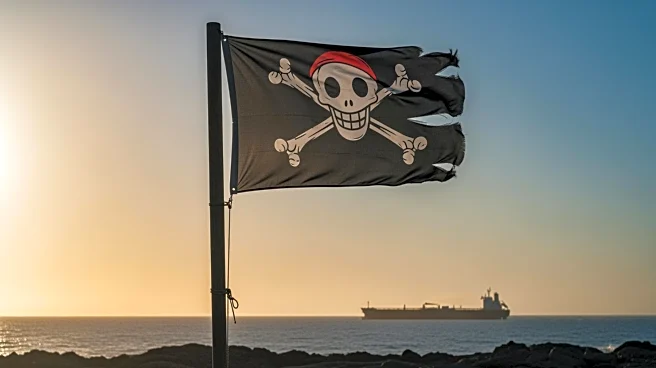What's Happening?
A Maltese-flagged tanker named Hellas Aphrodite was attacked and boarded by pirates approximately 550 nautical miles off the Somali coast. The incident occurred on November 6, while the vessel was transporting gasoline from Sikka, India, to Durban, South
Africa. The attack involved a small craft that approached the tanker, opened fire with small arms and RPGs, and subsequently boarded the vessel. All 24 crew members are reported safe and accounted for, according to Latsco Marine Management, the vessel's manager. The Iran-flagged fishing vessel 314055ISSAMOHAHMDI is suspected to have been used as a mothership in this attack and other recent incidents. This marks the second pirate attack in the region within a week, following an attempted boarding of the chemical tanker Stolt Sagaland on November 3.
Why It's Important?
The resurgence of pirate activity off the Somali coast poses a significant threat to international shipping routes, which are vital for global trade. The safety of crew members and the security of cargo are major concerns for shipping companies operating in these waters. The attacks highlight the ongoing risk of piracy in the region, which had previously seen a decline due to coordinated international military efforts. The use of dhows as motherships by Somali pirates extends their operational range, increasing the threat to vessels far from the coast. This situation may prompt renewed international focus on maritime security in the area.
What's Next?
Shipping companies and international maritime organizations may increase security measures and surveillance in the region to prevent further pirate attacks. There could be calls for enhanced naval patrols and cooperation among countries to address the threat. The situation may also lead to discussions on the effectiveness of current anti-piracy strategies and the need for updated approaches to safeguard shipping lanes.
Beyond the Headlines
The persistence of piracy off the Somali coast raises questions about the socio-economic conditions that drive individuals to engage in such activities. Addressing the root causes of piracy, such as poverty and lack of economic opportunities, could be crucial in reducing the threat in the long term. Additionally, the legal and ethical implications of dealing with captured pirates and ensuring justice for affected crew members remain important considerations.
















